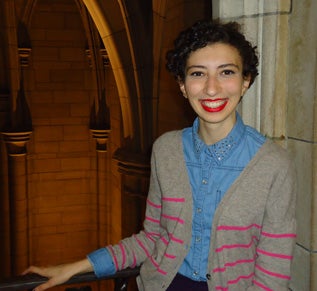Through language and culture, student seeks to
understand humanity
 Ranem Atia was somewhat late in coming to recognize her true academic love, having enrolled at the University of Pittsburgh with plans to study microbiology.
Ranem Atia was somewhat late in coming to recognize her true academic love, having enrolled at the University of Pittsburgh with plans to study microbiology.
But she came to believe that she would learn more about the human condition not by studying cells and bacteria, but by absorbing culture through analysis of its language. She chose anthropology as a major in the second semester of her freshman year, adding linguistics as a second major when she was a sophomore.
For Atia, the disciplines are all part of the same spectrum of understanding humankind.
“Linguistics is kind of a science, a humanity that is also a science,” she says. “And I could understand the culture by examining the language.”
A native of Egypt, Atia immigrated to the United States with her parents when she was in kindergarten, settling in Bloomsburg, Pennsylvania. She worked with a tutor to learn English until the third grade, drilling two hours each day. She credits her teacher with helping her acquire the language much faster than she would have been able to do on her own. After she declared her major in college, her former tutor was so proud to have influenced Atia’s life that she gave her outstanding pupil one of her old textbooks.
Atia chose Pitt because of its size and status as a research powerhouse. Having lived most of her life in a small town, she was also attracted to the greater cultural diversity of a city campus, “and of course, the Cathedral (of Learning) is the most beautiful thing I’ve ever seen,” she adds.
A class with Abdesalam Soudi, the professor who would later become her mentor, focused on Arabic linguistics, including sociolinguistics. Atia wrote a five-page essay about conversational closings in Arabic: how people say goodbye and how they prompt the end of a dialogue.
The topic fascinated her because, as a native speaker of Egyptian Arabic, she noticed how much care Arabs take to guard against offending the other party, bending over backwards to emphasize that they are ending the conversation out of necessity, not desire. She recalled 20-minute-long farewells between her parents and their friends.
“Arabic speakers take a ridiculously long time to end a conversation,” she explains. “It’s a polite language and a polite culture.”
She decided to expand her idea through a Brackenridge Summer Research Fellowship, with Soudi serving as her sponsor. Now, with an increased interest in psycholinguistics—how people perceive language and make meaning of words—Atia is focusing on translational ambiguity in spoken Arabic.
Anthropology influences her studies because different cultures of origin affect how students learn English as a second language as well as how they view the world in general. She cites a study about an African tribe whose members were asked to view several blue objects and one green triangle, then identify which was different. The tribespeople did not know, but they were able to differentiate among several green objects, because they have several words that describe green. The language influenced their ability to see different shades that other cultures could not discern.
Atia is thinking about adding psychology as a third major. She plans to attend graduate school and pursue research focusing on second language learning and acquisition. Ultimately, she hopes to work in a psycholinguistics lab, either at a university or a private institution such as the Max Planck Institute for Psycholinguistics in the Netherlands.
Because her field is ripe for interdisciplinary study, she is especially pleased with her decision to attend Pitt, which is large enough to offer a wide array of cross-disciplinary opportunities, such as the work she does in the psycholinguistics lab at the Learning Research and Development Center.
“There are so many resources you can use. You can go to the Honors College and talk to someone, and you’ll have all these other options you can look at,” she says. “I’m learning so much; I’m learning stuff outside of the classroom, from my peers. It’s amazing.”
